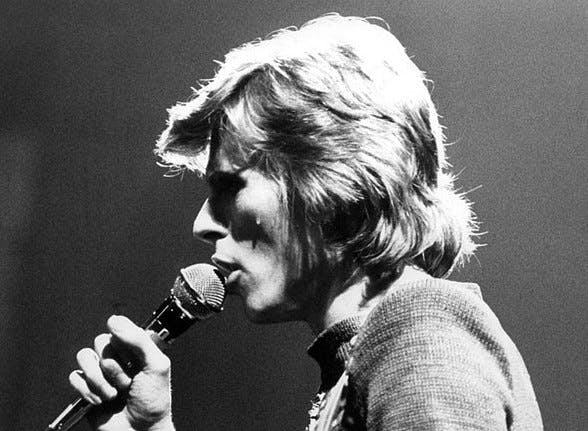‘Moonage Daydream’ Captures David Bowie’s Special Oddity
See it on the biggest screen you can find and with the best sound system possible — not only for the imagery, but the vivid soundtrack as produced by a longtime Bowie collaborator, Tony Visconti.

David Bowie (1947-2016) was pop music’s greatest chameleon, changing his musical identity with every era, practically with every new album. Likewise, Brett Morgan’s remarkable new film “Moonage Daydream” is impossible to describe in terms of conventional categories. A documentary? Not exactly. A biopic? Not even close. A concert film? Well, maybe.
Some viewers have labeled it a “fantasia” or an “extravaganza,” and possibly it’s all of the above. The film’s trailer proclaims it as “an immersive cinematic experience,” and as such, it rather ambitiously attempts to encapsulate the career and the artistry of one of the most remarkable musicians of the late 20th century — so maybe we should let it go at that.
As it happens, there are highly successful and very recent examples of traditional narrative biopics being produced about other British rock icons of Bowie’s approximate generation, including one about Freddie Mercury and Queen (“Bohemian Rhapsody,” 2018) and another on Elton John (“Rocketman,” 2019). There even was a Bowie biopic called “Stardust” in 2020 that no one seemed to like. Somehow, whatever it was that made Bowie special can’t be captured in the usual format, with an actor playing the singer-songwriter-actor-polymath.
The visuals in “Moonage Daydream” astutely reflect the myriad influences that went into Bowie’s work; when all is said and done, he was as much a visual artist as a musician. It’s not merely that he was also a painter, but rather that he invested so much of his focus in the visual aspect of his performances: the sets, the costumes, the choreography. In his use of extravagant attire and body language, he was a true student of 1970s Elvis, and a “performance artist” well before the phrase existed.
Biopics, by their definition, are about the backstory of an artist or a band. Mr. Morgen, however, is focusing on what we might call the front story. Rather than going behind the scenes, we are seeing what Bowie wanted us to see: the performer on stage, singing his songs, telling his stories. Those moments of the soundtrack that are not his music are the artist talking candidly in interviews — not so much about his background or personal life, but what the music means to him, his philosophy of living as expressed in his songs.
Throughout “Moonage Daydream,” we see representations of the international, multi-generational panoply of ideas that inspired Bowie, from Chinese spirituality to Japanese kabuki theater, from Italian commedia dell’arte to French surrealism to German silent film. The “Thin White Duke,” as Bowie was known in the mid-1970s, was ALSO influenced by the even thinner, whiter Duke known as Andy Warhol.
In 1969, Bowie’s career was essentially launched in tandem with the Apollo moon landing. The first song of his to achieve any traction was one of his greatest and still best known, “A Space Oddity,” and his first major success was the science-fiction style “Ziggy Stardust” project.
That was only to be the first of his many phases, a lead-in to his constant re-creation of himself as glitter rocker, blue-eyed soul singer, German minimalist, ’80s pop icon, and Tin Man, a career in which he was just as likely to collaborate with Iggy Pop as with Luther Vandross, Brian Eno as with disco king Nile Rodgers. All these phases are shown in the movie, rather like acts in a revue.
The film’s pace is lush and luxurious, one big rapturous moment that we don’t ever want to end. Yet, at the same time, it’s so rapidly edited and intercut as to be virtually schizophrenic. Somehow the film’s general tempo is both things, with a rhythm that is at once legato and staccato.
There’s very little actual biography — his parents are shown only briefly, as is Bowie’s most important mentor, his older half-brother, Terry. His first wife, Angela, and their son, the successful filmmaker Duncan Jones, are not mentioned, but Bowie’s widow, the one-time supermodel Iman, is presented as the focal point of love and stability for the last 25 years of his life.
Bowie’s almost suicidal cocaine addiction of the 1970s isn’t shown explicitly, but is perhaps reflected in the overall trippy nature of the work itself. It’s a movie you don’t need to get high to watch — it kind of replicates that experience for you. (For a more concrete and linear Bowie biography, Marc Spitz’s 2009 book, “Bowie,” is highly recommended.)
Like Bowie’s career and his best music, “Moonage Daydream” just keeps propelling relentlessly forward, with nary a pause for breath in its 140-minute running time. Perhaps the best way to describe it is as a multimedia concert of the gods, and maybe even a whole new kind of experience meant to be enjoyed in a movie theater — hopefully not the last of its kind. See it on the biggest screen you can find and with the best sound system possible, not only for the imagery, but the vivid soundtrack as produced by a longtime Bowie collaborator, Tony Visconti.
Mr. Morgan first proposed the project to Bowie 15 years ago, while the artist was still actively touring and recording. Yet it might be for the best that he wasn’t able to get “Moonage Daydream” into production until after the artist had departed earth to go and meet the Star Man, waiting in the sky. After all, it’s difficult to tell a story until it’s finished.
Despite the best intentions of both the filmmaker and his subject, there’s a nostalgia factor here that can’t be avoided. It takes us back to the highly personal moment when we first encountered Bowie — for me, it was that mind-boggling duet with Bing Crosby in 1977 — and he showed us how we all could be heroes, just for a day.

